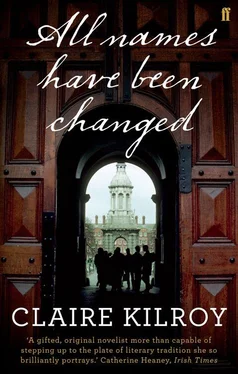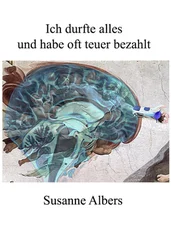Claire Kilroy - All Names Have Been Changed
Здесь есть возможность читать онлайн «Claire Kilroy - All Names Have Been Changed» весь текст электронной книги совершенно бесплатно (целиком полную версию без сокращений). В некоторых случаях можно слушать аудио, скачать через торрент в формате fb2 и присутствует краткое содержание. Год выпуска: 2010, Издательство: Faber & Faber, Жанр: Современная проза, на английском языке. Описание произведения, (предисловие) а так же отзывы посетителей доступны на портале библиотеки ЛибКат.
- Название:All Names Have Been Changed
- Автор:
- Издательство:Faber & Faber
- Жанр:
- Год:2010
- ISBN:нет данных
- Рейтинг книги:5 / 5. Голосов: 1
-
Избранное:Добавить в избранное
- Отзывы:
-
Ваша оценка:
- 100
- 1
- 2
- 3
- 4
- 5
All Names Have Been Changed: краткое содержание, описание и аннотация
Предлагаем к чтению аннотацию, описание, краткое содержание или предисловие (зависит от того, что написал сам автор книги «All Names Have Been Changed»). Если вы не нашли необходимую информацию о книге — напишите в комментариях, мы постараемся отыскать её.
All Names Have Been Changed — читать онлайн бесплатно полную книгу (весь текст) целиком
Ниже представлен текст книги, разбитый по страницам. Система сохранения места последней прочитанной страницы, позволяет с удобством читать онлайн бесплатно книгу «All Names Have Been Changed», без необходимости каждый раз заново искать на чём Вы остановились. Поставьте закладку, и сможете в любой момент перейти на страницу, на которой закончили чтение.
Интервал:
Закладка:
His dishevelled girl swayed on her feet as if her father’s words had lulled her into a trance. She reminded me of Aisling at that moment, the way she lost herself. Glynn tipped a finger under her chin, attempting to raise her face. This level of intimacy proved a step too far. Sofia snapped out of the trance and shoved Glynn with both hands so violently in the chest that he staggered backwards. Her face was marbled red and white.
‘I hate you, you cow!’ she screamed. You cow ; there was no mistaking it. The only words we’d caught from the entire exchange.
‘Deary me,’ said Antonia, folding her arms with satisfaction. Sofia’s outburst had hit the spot. Antonia loved that sort of thing — not other people’s distress, but their botched mismanagement of it. Made her feel better about her own life, I suppose. At least Antonia knew how to conduct herself during a dramatic crisis. So she liked to think.
Sofia turned and ran away like a walloping great child, flat-footed in her white nurse shoes, bumping into students along the way before disappearing under Front Arch. Glynn just stood there watching her recede, the rancid hanky still in his hand. Faye said it was enough to break your heart. Mmm, I murmured along with the others, but I was glad to see the back of her.
Suddenly the women crowded around Guinevere, who was standing with both palms pressed against the wall, leaning her weight against it. With her eyes shut like that, and her lips drained of blood, her face was as colourless as a death mask, as Aisling’s.
The other three elbowed me out of the way and lead her to the door. ‘What’s happening?’ I asked, but none of them answered. ‘It’s okay, chicken, we’ve got you,’ Faye was coaxing her. I followed them out to the landing. They were helping her down the stairs.
‘What’s wrong with her?’ I asked their descending backs, as if Guinevere couldn’t speak for herself. ‘Is she going to be okay?’ I trailed down the stairs in their wake, yapping at their heels. They entered the women’s toilet. I grabbed Antonia’s wrist just before the door closed behind her. ‘What the hell’s going on? Tell me.’
‘It’s her period, fuckhead.’
The door slammed shut in my face, leaving me standing alone in the empty corridor. Quiet out there, after the commotion. It was as if they’d passed into the wall. That door was as good as a wall to me. I could not pass beyond it. A plate sticker of a matchstick woman warded me off like a skull and crossbones. The triangular skirt and spherical head seemed less a representation of womanhood than a delineation of man’s limited understanding of it.
I could hear them inside, murmuring, crooning, their voices pitched low to deliberately drive me mad. What rites and rituals were under way in there? It should have been a question mark depicted on that plate sticker, or a set of quotation marks containing nothing. A pair of mirrors adjusted to reflect infinity. A pentangle, a sprig of hemlock, twigs bound into a bundle. The circle and triangle didn’t begin to cover it. Fuckhead, Antonia had called me.
Glynn rounded the corner, catching me with my ear pressed to the door. I jumped back to find him at the far end of the corridor, battle-scarred from his skirmish with his obtuse, abstruse daughter who had just called him, of all things, and in front of everyone, a cow. You couldn’t make it up. On his face was the same expression I felt written all over my own, a combination of resentment and disbelief.
He angled a weary eye at the isosceles triangle on the plate sticker, then down at me hovering below it. Big white ovum, tiny wriggling sperm, whining for admittance to the female toilets. A no-win situation, if ever he saw one. He placed a heavy hand on the banister and a leaden foot on the stair. ‘Are you right?’ he asked me gruffly, but fondly enough all the same. I nodded and followed him up.
21 Woe was general all over Ireland
‘Here Comes Everybody,’ Glynn said glumly when the four women finally joined us upstairs, having taken their sweet time. Aisling had embarked on a novel. That was the day’s big news. She distributed a partial manuscript to each of us when her turn to read came.
It was like one of her poems, only more so. I had not the slightest notion what it meant. There were over thirty characters in it, as far as I could make out. It shuttled back and forth in time through major civilisations: Hellenic, Celtic, Mycenaean and one wholly imaginary one — at least, I think it was wholly imaginary. It was written in a compulsively rhythmic Dublin street argot which was part observed, part invented. The Peamount Tuberculosis Hospital functioned as some class of portal. Sickness was a major trope. ‘It’s part one of a trilogy,’ she told us after she’d read out the first five pages. Her reading was met with silence.
When queried by Glynn, Aisling described the novel as the application of the apparatus of string theory to the traditional murder-mystery genre with a view to elucidating the chaos rife in our daily environment, from which there is no escape.
‘I see,’ said Glynn, leafing through her manuscript, pausing to read paragraphs at random. He was frowning. ‘And you’ve been working on this all year, have you?’
‘Em, no,’ said Aisling. ‘I started it this week.
‘This week?’
‘Yes. Monday.’
Glynn flicked to the end of the manuscript. Two hundred and sixteen pages in length. In three days. Two days, actually — Aisling had been with us since half eleven. He raised his glasses to his artist’s eye to peer at the girl. How stark she looked in the vivid company of the others, a black and white photograph in a roomful of colour, a figure from a past century transplanted to the modern age. ‘Have you been sleeping, Aisling?’ Glynn asked with a kindness we didn’t know he had in him. Aisling smiled shyly and shrugged, as if she wasn’t really sure. Her eyes were dark and glossy.
Glynn invited her to read a little more, though I wished he hadn’t. I was rapidly losing my bearings, such as they were. How had the girl managed to write so much in two days? It wasn’t physically possible. Syncope , the novel was called. Even the title was a reproof. I had no idea what it meant. Had she made that word up too? I glanced at the faces of the others for guidance. They gave nothing away, as usual.
Aisling leafed through her manuscript and settled on a passage about halfway through. We opened our copies to the designated page as if it were a hymnbook. This extract was entirely different in character to the novel’s opening, consisting solely of dialogue. Dialogue was my terrain. It was the only thing I was good at, the only thing the girls ever praised me for. Even Antonia had assented, sort of. (‘Have you considered trying your hand at a screenplay instead?’ was how she phrased it, meaning she thought my descriptive prose was crap.) Turned out Aisling had a natural flair for voices which far outshone mine. This was a gift her poetry had kept firmly hidden under a bushel.
Her switch from poetry was both abrupt and wholesale. Her first prose endeavour did not even have the safety net of being a short story. It was a shot at a novel and therefore possessed all the latent threat of a novel, all the danger, all the potential. A trilogy at that. Aisling had dived off at the deep end. I couldn’t get a handle on the words in front of me. The piece was so good that I was unable to quantify it. All I discerned from hearing her read was that I was no good, I should give up.
She read in her customary way, to which I was unable to grow accustomed: head lolling broken-necked over the page, arms dangling lamely by her side — what in the name of Jesus was wrong with her? The curtain of hair, blue-black as a magpie’s wing, concealed her face and the source of her voice, which was ventriloquial at the best of times but now seemed to be emanating a whole yard shy of her. I got it into my head that it was no longer Aisling under there. Were I to part that heavy curtain, I did not know who — or what — would look back at me.
Читать дальшеИнтервал:
Закладка:
Похожие книги на «All Names Have Been Changed»
Представляем Вашему вниманию похожие книги на «All Names Have Been Changed» списком для выбора. Мы отобрали схожую по названию и смыслу литературу в надежде предоставить читателям больше вариантов отыскать новые, интересные, ещё непрочитанные произведения.
Обсуждение, отзывы о книге «All Names Have Been Changed» и просто собственные мнения читателей. Оставьте ваши комментарии, напишите, что Вы думаете о произведении, его смысле или главных героях. Укажите что конкретно понравилось, а что нет, и почему Вы так считаете.












